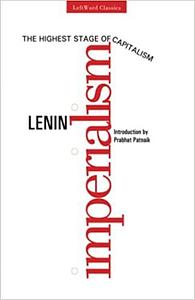Take a photo of a barcode or cover
challenging
dark
informative
slow-paced
Imperialism: The Highest Stage of Capitalism is a sharp and indispensable outline of the imperial character of capitalism in its mature form.
In this work, Lenin doesn’t simply describe imperialism as an aggressive foreign policy or isolated phenomenon — he defines it as a distinct historical stage in the development of capitalism, one characterized by monopoly, finance capital, and the global division of labor among competing imperialist powers.
In this work, Lenin doesn’t simply describe imperialism as an aggressive foreign policy or isolated phenomenon — he defines it as a distinct historical stage in the development of capitalism, one characterized by monopoly, finance capital, and the global division of labor among competing imperialist powers.
What makes this text enduringly powerful is Lenin’s dialectical method, which allows him to not only catalogue the features of imperialism but to reveal their interconnections, contradictions, and historical motion. The work is both relentless in its critique and immensely instructive, laying bare the economic logic behind colonial expansion, inter-imperialist rivalry, and the parasitic nature of advanced capitalist nations.
Lenin exposes how imperialism is not an aberration or optional policy but the inevitable outgrowth of capitalist accumulation once it reaches a certain level of concentration. The text offers invaluable clarity on the relationship between capitalism and global oppression, a framework that remains remarkably applicable to our current world order.
challenging
informative
medium-paced
Get ready to hear hundreds of statistics and numbers. I prefer his "Imperialism, and the Split in Socialism" because it's much less dry, but this book is still tolerable. Lenin ties the rise of monopolies in capitalism to colonialism in order to synthesize his version of Imperialism, and although I wish he had gone more onto the effects of it on the workers of the exploited countries, he nonetheless critiques opportunists, liberals, and other leftists who hold flawed views on the subject, making this a useful text for understanding the origins of the term as well as to not fall to chauvinism. Although I expected more, I still learned a lot, especially about finance capital and its relation with industrial capital.
informative
reflective
A useful and interesting look into the birth of finance aristocracy.
informative
medium-paced
informative
slow-paced
I wasn’t intending to read this book but it came up in conversation with a friend and the next thing I knew I’d agreed to read it. So here we are.
I found it pretty dry, and less engaging than The State and Revolution. Lenin grapples with the emergence of monopolies and the transition from industrial capital into finance capital through the close cooperation of banks and industrial cartels. At first he seemed to be using imperialism as an analogy (capitalist enterprises conquer economic territory, in essence), but this later developed into an assertion that monopolistic capitalism and imperialism are one and the same. I’m not entirely convinced by this argument but I do recognise that capitalism, being driven by exploitation and expansionism (and driving further exploitation and expansionism in turn), naturally tends towards imperialism. There is a clear incentive to lay claim not only to resources and labour but also to potential markets.
I really did get the impression that Lenin wanted to write about the changing character of capitalism and only added the imperialism framing later, perhaps in a deliberate attempt to fold emerging anti-colonial movements into the Marxist struggle. I can’t say for sure. It just seems strange for a book titled Imperialism to have so much to say about bank deposits and so little to say about racism, myths of manifest destiny, etc. Even the statistics on colonial territories don’t reflect the experiences – the actual material conditions – of people living in those territories; they’re just statistics. Also of note are Lenin’s attempts to pin imperialism solely on capitalism (and to conflate the two). I despise capitalism as much as the next prole but I think it would be naive to genuinely consider it the root of all evils, and I find it a little suspicious considering Lenin’s advocacy for a socialist state. Of course he wants us to think the state is a fundamentally good structure and it’s only the corrupting influence of capital which brings about injustice.
In all, this book felt lacking. Some good observations here and there but not enough to warrant recommendation. It seems I don’t get on with Lenin. I wouldn’t want to play Monopoly with him.
challenging
informative
slow-paced
"El imperialismo es el capitalismo en la fase de desarrollo en que se ha implantado el dominio de los monopolios y del capital financiero, en que la exportación del capital ha adquirido gran relevancia, en que los trusts internacionales han empezado ha repartirse el mundo y en que ha terminado el reparto del planeta entre las grandes potencias capitalistas."
Vladimir Lenin
Vladimir Lenin
challenging
hopeful
informative
inspiring
medium-paced
Suuuuper important book and still so relevant. I found reading comprehension difficult just because of the tone and structure of the writing but thanks to my reading group I was able to gain loads of knowledge from the book.
informative
reflective
slow-paced
Prescient but boring as hell. This was groundbreaking for the time, but with the info that I have, it’s just repeating things I already know and understand. Definitely better and more engaging things which communicate the same things.





